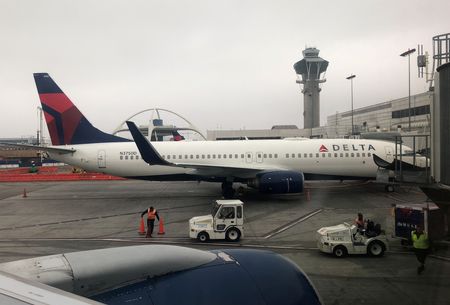By David Shepardson
WASHINGTON (Reuters) -Delta Air Lines said on Friday it will not use artificial intelligence to set personalized ticket prices for passengers after facing sharp criticism from U.S.
lawmakers and broad public concern.
Last week, Democratic Senators Ruben Gallego, Mark Warner and Richard Blumenthal said they believed the Atlanta-based airline would use AI to set individual prices, which would “likely mean fare price increases up to each individual consumer’s personal ‘pain point.'”
Delta said it has not used AI to set personalized prices but previously said it plans to deploy AI-based revenue management technology across 20% of its domestic network by the end of 2025 in partnership with Fetcherr, an AI pricing company.
“There is no fare product Delta has ever used, is testing or plans to use that targets customers with individualized prices based on personal data,” Delta told the senators in a letter on Friday, seen by Reuters.
“Our ticket pricing never takes into account personal data.”
Senators praised Delta’s commitment not to use AI for personal pricing but expressed many questions and want more details about what data Delta is collecting to set prices.
“Delta is telling their investors one thing, and then turning around and telling the public another,” Gallego said.
“If Delta is in fact using aggregated instead of individualized data, that is welcome news.”
Delta declined comment on Gallego’s statement.
The senators cited a comment in December by Delta President Glen Hauenstein that the carrier’s AI price-setting technology is capable of setting fares based on a prediction of “the amount people are willing to pay for the premium products related to the base fares.”
Last week, American Airlines CEO Robert Isom said using AI to set ticket prices could hurt consumer trust.
“This is not about bait and switch.
This is not about tricking,” Isom said on an earnings call, adding “talk about using AI in that way, I don’t think it’s appropriate. And certainly from American, it’s not something we will do.”
Democratic lawmakers Greg Casar and Rashida Tlaib last week introduced legislation to bar companies from using AI to set prices or wages based on Americans’ personal data and would specifically ban airlines raising individual prices after seeing a search for a family obituary.
They cited a Federal Trade Commission staff report in January that found “retailers frequently use people’s personal information to set targeted, tailored prices for goods and services — from a person’s location and demographics, down to their mouse movements on a webpage.”
The FTC cited a hypothetical example of a consumer profiled as a new parent who could intentionally be shown higher-priced baby thermometers and collect behavioral details to forecast a customer’s state of mind.
Delta said airlines have used dynamic pricing for more than three decades, in which pricing fluctuates based on a variety of factors like overall customer demand, fuel prices and competition, but not a specific consumer’s personal information.
“Given the tens of millions of fares and hundreds of thousands of routes for sale at any given time, the use of new
technology like AI promises to streamline the process by which we analyze existing data and the speed and scale at which we can respond to changing market dynamics,” Delta’s letter said.
(Reporting by David Shepardson; Editing by Chizu Nomiyama, David Gregorio and Diane Craft)











